Hitachi Deskstar 7K1000 in RAID 0: Is Two Terabytes really better than One?
by Gary Key on April 19, 2007 12:15 AM EST- Posted in
- Storage
Actual Application Performance
Our application benchmarks are designed to show application performance results with times being reported in seconds, with lower scores being better. While these tests will show some differences between the drives it is important to understand we are no longer measuring the pure performance of the hard drive but how well our platform performs with each individual drive. In that sense, these are the more real-world tests that show how hard drives and RAID 0 can impact your everyday computer use.
The performance of a hard drive is an integral part of the computer platform but other factors such as memory, CPU, core logic, and even chipset driver choices can play a major role in determining how well the hard drive performs in any given task. Also worth noting is that new features of Windows Vista - specifically SuperFetch - can further reduce the measured performance differences between hard drives.
Game Load Tests
In our Half-Life 2: Lost Coast test we measure the time it takes to load the game with the application timer starting when the play game icon is initiated in the Steam menu until the main game menu appears.
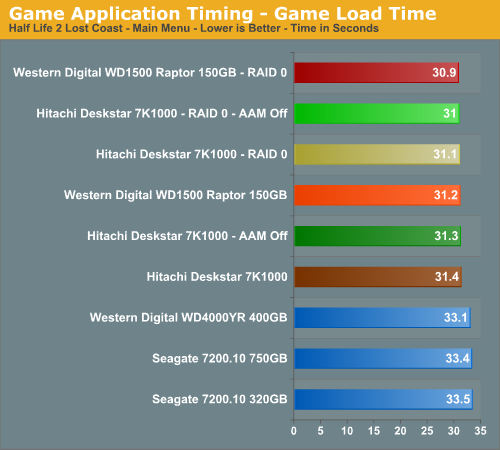
The results speak for themselves with the RAID 0 setups offering extremely minor performance improvements in actual game load testing. You will likely not be able to notice any differences during actual game play with a RAID 0 setup. We know it was impossible for us.
Our Sims 2 - Open for Business test measures the time it takes to load the initial portion of the game. Our application timer starts when the game icon is initiated until the neighborhood menu appears.
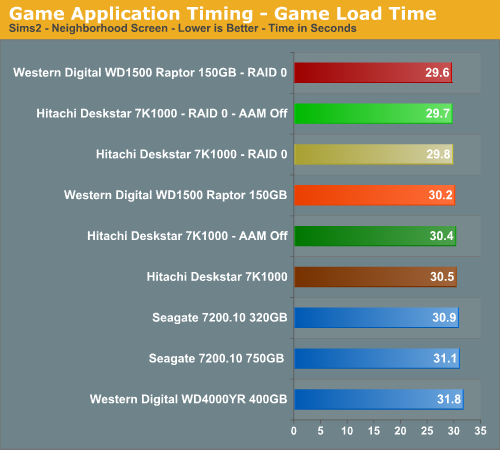
We witnessed 38% to 50% improvements in our iPeak tests in this game but measure less than a 2% difference in actual game load times. Without a benchmark, these differences are impossible to witness during actual game play. Once again, we see the Raptors slightly ahead but the 7K1000 for all intents and purposes is even in our game benchmarks.
Game Level Load
This test centers on the actual loading of a playable level within our game selections. We run Battlefield 2 and measure the time it takes to load the Daqing Oilfields level. Our application timer begins when the start single player icon is initiated and ends when the join game icon is visible.
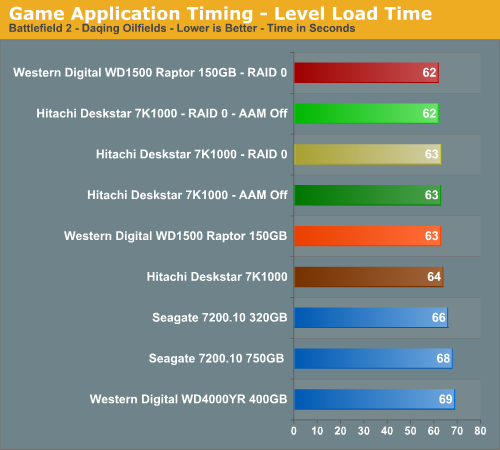
Once again we see a minimal difference between our RAID 0 and single drive configurations in this benchmark with only a one second difference in load times. In repeated testing it was difficult to discern any differences between the RAID 0 and single drive setups. On a side note, we firmly believe the areal density and 32 MB cache advantages of the Hitachi 7K1000 make up for the rotational and random access advantages of the Raptor in our gaming tests.
WinRAR 3.62
Our WinRAR test measures the time it takes to compress our test folder that contains 444 files, 10 folders, and 602MB of data. This is same test folder utilized in our iPeak test suite. This benchmark is extremely CPU/RAM intensive but it may require a fast storage system to keep pace.
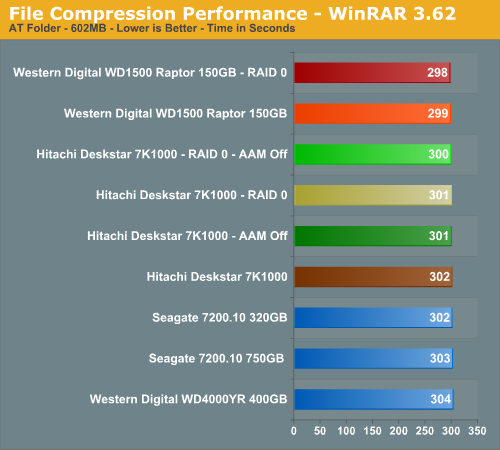
Our iPeak test showed a 50% advantage for the RAID 0 setups but we see an insignificant difference in the actual test results. One would assume the potential write speed advantages of a RAID 0 setup would have a larger impact on performance in this benchmark but in actuality CPU throughput makes a far more significant difference.
Nero Recode
Our encoding test is quite easy - we take our original Office Space DVD and use AnyDVD Ripper to copy the full DVD to the hard drive without compression, thus providing an almost exact duplicate of the DVD. We then fire up Nero Recode 2, select our Office Space copy on the hard drive, and perform a shrink operation to allow the entire movie along with extras to fit on a single 4.5GB DVD disc. We leave all options on their defaults except we turn off the advanced analysis option. The scores reported include the full encoding process and are represented in seconds, with lower numbers indicating better performance.
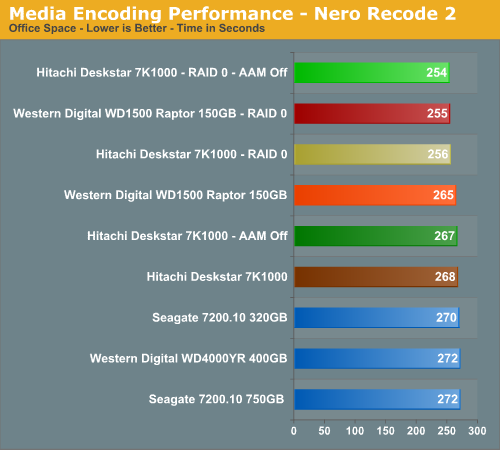
The iPeak results showed a 93% improvement with RAID 0 and we know from previous experience that RAID 0 can make a difference in this particular test. How large the difference would be was anybody's guess, but we figured it was the last chance for RAID 0 to generate any meaningful performance improvements. In the end, we did have measurable differences between the two setups with the RAID 0 configurations performing about 5% better. If you do a lot of video encoding then RAID 0 could end up saving you some precious minutes each day. Is it worth the cost or effort? Probably not, but it is one area besides benchmarking where RAID 0 actually made a difference. Of course, if you don't already have the fastest CPU for encoding available, that would have a far greater impact than RAID 0.
File Copy Performance
Our file copy test measures the time it takes to transfer our test folder that contains 29 files, 1 folder, and transfers 7.55GB of data from our source drive to the target test drive. This is same test folder utilized in our iPeak test suite. This benchmark is disk write intensive and requires a fast storage system.
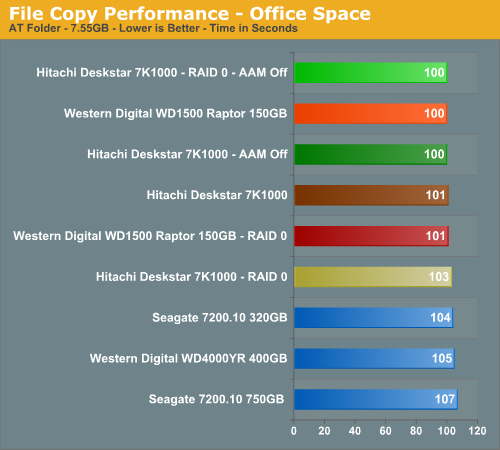
We finish our tests with a benchmark that should have favored the RAID 0 setups due to a pure write scenario. Unlike our iPeak test (and for that matter a similar test in PCMark05) where the largest differences in scores between setups were generated, we have RAID 0 making no difference in this test and actually scoring worse than a single drive setup in two instances.
Our application benchmarks are designed to show application performance results with times being reported in seconds, with lower scores being better. While these tests will show some differences between the drives it is important to understand we are no longer measuring the pure performance of the hard drive but how well our platform performs with each individual drive. In that sense, these are the more real-world tests that show how hard drives and RAID 0 can impact your everyday computer use.
The performance of a hard drive is an integral part of the computer platform but other factors such as memory, CPU, core logic, and even chipset driver choices can play a major role in determining how well the hard drive performs in any given task. Also worth noting is that new features of Windows Vista - specifically SuperFetch - can further reduce the measured performance differences between hard drives.
Game Load Tests
In our Half-Life 2: Lost Coast test we measure the time it takes to load the game with the application timer starting when the play game icon is initiated in the Steam menu until the main game menu appears.

The results speak for themselves with the RAID 0 setups offering extremely minor performance improvements in actual game load testing. You will likely not be able to notice any differences during actual game play with a RAID 0 setup. We know it was impossible for us.
Our Sims 2 - Open for Business test measures the time it takes to load the initial portion of the game. Our application timer starts when the game icon is initiated until the neighborhood menu appears.

We witnessed 38% to 50% improvements in our iPeak tests in this game but measure less than a 2% difference in actual game load times. Without a benchmark, these differences are impossible to witness during actual game play. Once again, we see the Raptors slightly ahead but the 7K1000 for all intents and purposes is even in our game benchmarks.
Game Level Load
This test centers on the actual loading of a playable level within our game selections. We run Battlefield 2 and measure the time it takes to load the Daqing Oilfields level. Our application timer begins when the start single player icon is initiated and ends when the join game icon is visible.

Once again we see a minimal difference between our RAID 0 and single drive configurations in this benchmark with only a one second difference in load times. In repeated testing it was difficult to discern any differences between the RAID 0 and single drive setups. On a side note, we firmly believe the areal density and 32 MB cache advantages of the Hitachi 7K1000 make up for the rotational and random access advantages of the Raptor in our gaming tests.
WinRAR 3.62
Our WinRAR test measures the time it takes to compress our test folder that contains 444 files, 10 folders, and 602MB of data. This is same test folder utilized in our iPeak test suite. This benchmark is extremely CPU/RAM intensive but it may require a fast storage system to keep pace.

Our iPeak test showed a 50% advantage for the RAID 0 setups but we see an insignificant difference in the actual test results. One would assume the potential write speed advantages of a RAID 0 setup would have a larger impact on performance in this benchmark but in actuality CPU throughput makes a far more significant difference.
Nero Recode
Our encoding test is quite easy - we take our original Office Space DVD and use AnyDVD Ripper to copy the full DVD to the hard drive without compression, thus providing an almost exact duplicate of the DVD. We then fire up Nero Recode 2, select our Office Space copy on the hard drive, and perform a shrink operation to allow the entire movie along with extras to fit on a single 4.5GB DVD disc. We leave all options on their defaults except we turn off the advanced analysis option. The scores reported include the full encoding process and are represented in seconds, with lower numbers indicating better performance.

The iPeak results showed a 93% improvement with RAID 0 and we know from previous experience that RAID 0 can make a difference in this particular test. How large the difference would be was anybody's guess, but we figured it was the last chance for RAID 0 to generate any meaningful performance improvements. In the end, we did have measurable differences between the two setups with the RAID 0 configurations performing about 5% better. If you do a lot of video encoding then RAID 0 could end up saving you some precious minutes each day. Is it worth the cost or effort? Probably not, but it is one area besides benchmarking where RAID 0 actually made a difference. Of course, if you don't already have the fastest CPU for encoding available, that would have a far greater impact than RAID 0.
File Copy Performance
Our file copy test measures the time it takes to transfer our test folder that contains 29 files, 1 folder, and transfers 7.55GB of data from our source drive to the target test drive. This is same test folder utilized in our iPeak test suite. This benchmark is disk write intensive and requires a fast storage system.

We finish our tests with a benchmark that should have favored the RAID 0 setups due to a pure write scenario. Unlike our iPeak test (and for that matter a similar test in PCMark05) where the largest differences in scores between setups were generated, we have RAID 0 making no difference in this test and actually scoring worse than a single drive setup in two instances.










48 Comments
View All Comments
MadAd - Saturday, April 21, 2007 - link
<quote>Sorry but saving even 5 secs out of 10, 5 times a day is not work the extra money to me</quote>I take it you dont play battlefield 2 then. Having just two or three seconds advantage on each mapchange can mean the difference between a round flying a jet or helo, or a few seconds later watching everyone else fly off and being left with a humvee (if you are very lucky) or nothing at all.
Of course not all games have this problem however with bf2 when there are 32 players a side and only 2 jets each then its the quickest in that gets first picks, and if it takes running raid 0 just to pick up that extra second or two, then so be it.
ShadowdogKGB - Saturday, April 21, 2007 - link
My four little Hitachi 80gigs in R0 will load the single player Daging Oilfields in 18-20 seconds. Hows that for real world performance. Or maybe somebody from the church of the anti-raid can explain that away for me. My point of contention from this article is that the author went out of his way to denigrate the concept of raid. And another point is that you don't buy a 1 terabyte hard drives just to put them in raid, and especially put them in raid 0. These babies are for storage. You're definitely are not going to want 2 Terabytes of data sitting on a fragile Raid 0. No, this article is just plain skewed. Now there's gonna be a bunch of knuckle heads pointing to these benchmarks and saying "See? See? I told you so!" Yeah, HL2 Lost Coast. That's not even a real game. And The Sims2? Oh please. Yeah that's real world performance figures right there. Bleh. I'm no programmer or mathematician but I could have done a more decent article on this subject than this amateur.Axbattler - Friday, April 20, 2007 - link
I do not buy the 'extra money' argument that much (**). It's not like performance is the only (*possible) gain from striping two drives. The second drive get you extra capacity, and as long as people choosing to go RAID-0 are using the extra space, then they are not paying a financial premium over buying two drives and running them separately (unless they need to purchase a RAID controller). To me, the main cost from going RAID-0, is the added risk in case of failure.* Though I am in the school of thought that RAID-0, do not provide significant performance boost in the majority of the cases, I do find gains more often than penalties (from overhead).
Regarding from the article results, I am not surprised by the game loading results. I do, however suspect that the performance benefit of RAID-0 may be more noticeable in XP boot up time however (whether that is important enough, I'll shrug to it. Not my cash).
The file copy result make me wonder if there is not a bottleneck elsewhere though.
7.55 *1024 / 100 = 77.312 MB/sec on average. That's the transfer rate of a single drive.
** I do make an exception to people stripping Raptor's. I can't think of many desktop users who have enough 'performance sensive' applications (OS, apps, games - as opposed to multimedia files for instance) they use regularly - so much that they would need a second Raptor in the same rig. I do suspect that those users are really going for the bragging right rather than the 'free performance'.
Lastly, I wonder if RAM Disks, in their current form, are really faster the fastest SCSI drives at loading games. I seem to remember benchies of i-RAM some time ago showing it to edge the 150GB Raptor by not that much.
Griswold - Thursday, April 19, 2007 - link
Absolutely agree. The only winner is the storage industry.gramboh - Thursday, April 19, 2007 - link
No kidding, been waiting for the Seagate for a while. It will also be nice to see 250GB platters (x4) on a 1TB drive. I'm running 2x 7200.10 500's right now and am happy with them. I'd like 1TB to come out to push drive costs down so I use a few for external back-up.BoberFett - Thursday, April 19, 2007 - link
Anybody who stripes drives of this size is asking to lose a lifetime's worth of data. Even assuming it's data than can be reassembled such as ripped or downloaded music and movies, the time required to reassemble that data is pretty significant.goinginstyle - Thursday, April 19, 2007 - link
Glad to see you guys still telling it like it is with RAID 0. I am just waiting on the comments to come in from people who swear it lets them operate their systems at light speed. This drive seems to be really nice but I will wait for the Seagate 1TB to come out before making an upgrade decision. When is it coming out?Gary Key - Thursday, April 19, 2007 - link
The Seagate 1TB drives are due out in four to six weeks according to the last information we had from them.